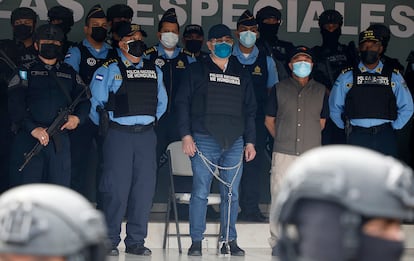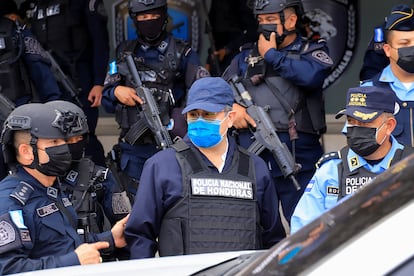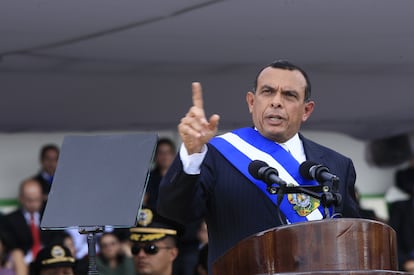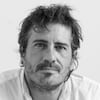The rise and fall of Juan Orlando Hernández’s political dynasty in Honduras
The former president, who was arrested on Tuesday, used his power to crush rival cartels and ensure a monopoly on cocaine trafficking for himself and his associates, according to a US indictment

Fate decreed that the first person former Honduran president Juan Orlando Hernández saw when he opened his door to surrender to the police at midday on Tuesday was the minister of security, Ramón Sabillón. Until a few weeks ago, Sabillón was another fugitive from justice who had served as chief of police until 2016, when he fled the country for fear Hernández’s men – whom he described as “state violence” – would eliminate him and his family for the part he played in bringing down cartel bosses and for denouncing his superiors for complicity in the drug trafficking trade. Sabillón went into self-imposed exile with his family after being kicked off the force under the shadow of accusations that ranged from robbery to involvement in drug trafficking with the goal of bringing him down and preventing his return to Honduras.
However, the new era ushered in by the rise to power of Xiomara Castro on January 27 permitted Sabillón to return to the country and the new president decided to cast him as a symbol of a new beginning. Just a few days later, Sabillón was afforded the opportunity to remove a long-standing thorn in his side.
As such, when the door to the elegant residence in the Las Palmas de San Ignacio neighborhood in Tegucigalpa was opened, Sabillón stepped up to Hernández and, without removing his face mask, said coolly: “We are complying with all your guarantees.” He put a bullet-proof vest on the former president, placed handcuffs on his hands and feet – a humiliation normally reserved for gang members – and escorted him to a police station where he was presented to the waiting media.
After Castro was elected president and sworn in on January 27, Hernández’s freedom lasted for exactly 18 days. It came to an end when the US issued an extradition warrant for his alleged involvement in trafficking thousands of kilos of cocaine into the country. As Hernández was taken into custody on Tuesday, the police chief said that fireworks and street parties spontaneously erupted in some areas of San Pedro Sula. In accordance with legal protocols, Hernández was brought before the Supreme Court of Justice at 10am on Wednesday morning, where judge Edwin Ortez Cruz was due to decide on the next steps to be taken, among them a possible challenge to the US order. However, everything points to Hernández being extradited in the next few days thanks to a reform of Honduran law approved by his own administration.

The US Embassy’s extradition request was sent to the Ministry of Foreign Affairs to be forwarded to the Supreme Court of Justice, which issued a warrant stating that Juan Orlando Hernández is wanted for trial in the United States on charges of drug trafficking and firearms offenses. US prosecutors summed up the case as “state-sponsored drug trafficking,” given that Hernández allegedly formed part of “a violent drug-trafficking conspiracy” that smuggled around 500,000 kilos from Honduras into the US.
In the face of the severity of the accusations, the operation to detain Hernández was focused on his own safety. The former president spent his first night in police custody in isolation, under heavy guard in a cell in the barracks of Los Cobras, the Honduran special forces. As to what Hernández can expect from here, experts believe it will depend in large part on the level of cooperation he offers to the US, but his sentence could be in the range of 10 years to life imprisonment. According to Salvador Nasralla, Castro’s vice president and an avowed enemy of Hernández, the former president will likely negotiate with US authorities by offering to reveal smuggling routes used by the cartels, front men and other figures involved in drug trafficking in a bid to reduce his sentence.
While the level of Hernández’s alleged involvement with the cartels is being probed, another former president will not sleep easy over the coming days: Porfirio Lobo Sosa, who was in power from 2010 to 2014. The 14-page document sent to the Honduran Ministry of Foreign Affairs laying out the charges against Hernández also mentions his predecessor, alleging that both Hernández and Porfirio Lobo received vast sums of money from Amílcar Alexander Ardón Soriano, alias “Chande,” for protection.

“In or around 2009, Hernández’s political ally, Porfirio Lobo Sosa, alias Pepe Lobo, began a campaign to become president of Honduras. At around that time, Hernández and Lobo Sosa worked together to obtain around $2 million [€1.76 milion] in drug-trafficking profits from Ardón Soriano, alias Chande, a former Honduran drug trafficker and at that time the mayor of El Paraíso, a ranching town in Copán Department,” the document reads.
Ardón eventually became key to the arrest of the former president, as he told a jury at the beginning of the trial of Hernández’s brother, Tony Hernández, that he had been present at a meeting in 2013 at which Joaquín “El Chapo” Guzmán handed over $1 million (€880,000) in cash for Hernández’s presidential campaign. Ardón detailed various payments to politicians, including Lobo Sosa, which served to bring an end to a political drug-trafficking dynasty that extended to the highest echelons of the National Party of Honduras, which has governed Honduras over the past few decades.
When Sabillón turned up on Hernández’s doorstep, it was not difficult to imagine he was one of the happiest men in the world at that moment.
Tu suscripción se está usando en otro dispositivo
¿Quieres añadir otro usuario a tu suscripción?
Si continúas leyendo en este dispositivo, no se podrá leer en el otro.
FlechaTu suscripción se está usando en otro dispositivo y solo puedes acceder a EL PAÍS desde un dispositivo a la vez.
Si quieres compartir tu cuenta, cambia tu suscripción a la modalidad Premium, así podrás añadir otro usuario. Cada uno accederá con su propia cuenta de email, lo que os permitirá personalizar vuestra experiencia en EL PAÍS.
¿Tienes una suscripción de empresa? Accede aquí para contratar más cuentas.
En el caso de no saber quién está usando tu cuenta, te recomendamos cambiar tu contraseña aquí.
Si decides continuar compartiendo tu cuenta, este mensaje se mostrará en tu dispositivo y en el de la otra persona que está usando tu cuenta de forma indefinida, afectando a tu experiencia de lectura. Puedes consultar aquí los términos y condiciones de la suscripción digital.









































